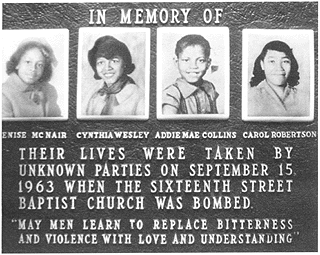4 Little Girls/One Huge Legacy
The Texas Documentary Tour
By Jerry Johnson, Fri., April 3, 1998

There is a defining moment in Spike Lee and Sam Pollard's Academy Award-nominated 4 Little Girls, a documentary about the 1963 Ku Klux Klan bombing of the 16th Street Baptist Church in Birmingham, Alabama which ended the lives of four girls. This moment provides a bridge between the legendary and near-mythical status of the civil rights movement of the 1950s and 1960s and the intimate and very human reality of the individual men and women who were involved in it: "When young people today ask me, `When are we going to be able to get together like you all were in the Sixties?' - I tell them nobody was together in the Sixties," says Reverend Andrew Young of the Southern Christian Leadership Conference (SCLC). "It was a small group of dedicated people who got it all started." For Pollard, the co-producer and editor of the film who will be present in Austin to introduce it during its Texas Documentary Tour screening this Wednesday, this represented the bridging approach that he and Lee were adamant on taking toward their subject matter. "It was important, first of all, to make sure the four girls came alive in the telling of the story. And the second thing was to make sure there was a social and political context for their existence. So we decided to use a parallel structure to tell the stories of the girls in juxtaposition to the evolution of the civil rights struggle as was specifically particular to Birmingham." And for a younger generation whose knowledge of the civil rights struggle comes primarily from history textbooks, this micro-analysis of the nuts and bolts of the battle-like process is a refreshing revelation, indeed.
It is the storytelling strategy and its respect for the engrossing real-life events that gives the film its potency, and this reflects Pollard's extensive bicameral experience in the film business. A filmmaker for over 25 years, he worked primarily in the documentary field (including serving as producer on the acclaimed PBS series Eyes on the Prize) before becoming Spike Lee's editor on such narrative features such as Mo' Better Blues, Jungle Fever, Clockers, and Girl 6. His expertise in both fields is evidenced by one particularly powerful interview with George Wallace. Using such narrative devices as jump cuts, different film stocks, and varying focal lengths, the scene cuts to the heart of the horror of George Wallace and everything he stood for in a little more than a minute of screen time. It represents a penultimate example of the fusion of high drama and documentary.
Despite the fact that they were conducted 23 years after the fact, the interviews with the four girls' family members contain a startling immediacy. And each individual reflects back on the events with a remarkable bearing of both internal fortitude and grace that, despite all of the hate and chaotic insanity directed toward them, comes with the self-awareness of their moral certainty and rightness in the face of evil. Unlike the racist forces aligned against them, "They didn't have a pathology," explains Pollard. "They didn't walk around thinking `We need to figure out a way to hate white people as much as they hate us.' They understood the parameters of what their existence was all about and they figured out how to be real human beings and live and struggle within that." Tommy Wren of the SCLC sums it up best in the film: "I used to be afraid of `Bull' Connor [the malevolent Commissioner of Public Safety in Birmingham at the time who lead police attacks against marchers] until I discovered he was crazy."
It was also the family members' sense of moral rightness that led them to protect their story for as long as they did. Christopher McNair, father of one of the slain girls and something of the keeper of the story, had been approached many times over the years by filmmakers and authors who wanted him to lend his support and input to their projects. "Chris has a great reputation with and the respect of the community, and he was not going to have a filmmaker come there and exploit the family or their story," says Pollard. "He finally agreed to cooperate with us and with his involvement, although there was some initial reluctance on the part of the other families, they too came around and opened up to Spike and me." And it is our good fortune they did open up for a film that not only provides a further detailed historical account of events that still have significant relevance today (especially in light of the recent spate of bombings of African-American churches across the South), but also uncovers a gripping drama of human loss, tragedy, and redemption.
The Texas Documentary Tour will present 4 Little Girls on Wednesday, April 8, at 6 & 9pm. Admission is $5 for the general public; $3.50 for Austin Film Society memebers and students. Sam Pollard will introduce the film and conduct a Q&A session after each screening. The Texas Documentary Tour is a co-presentation of the Austin Film Society, the University of Texas RTF Dept., The Austin Chronicle, and SXSW Film.






